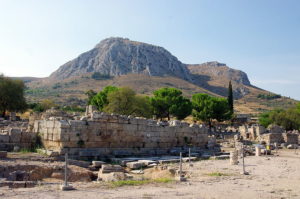[12] Γαλλίωνος δὲ ἀνθυπάτου ὄντος τῆς Ἀχαίας κατεπέστησαν οἱ Ἰουδαῖοι ὁμοθυμαδὸν τῷ Παύλῳ καὶ ἤγαγον αὐτὸν ἐπὶ τὸ βῆμα, [13] λέγοντες ὅτι “Παρὰ τὸν νόμον ἀναπείθει οὗτος τοὺς ἀνθρώπους σέβεσθαι τὸν θεόν.” [14] μέλλοντος δὲ τοῦ Παύλου ἀνοίγειν τὸ στόμα εἶπεν ὁ Γαλλίων πρὸς τοὺς Ἰουδαίους, “Εἰ μὲν ἦν ἀδίκημά τι ἢ ῥᾳδιούργημα πονηρόν, ὦ Ἰουδαῖοι, κατὰ λόγον ἂν ἀνεσχόμην ὑμῶν: [15] εἰ δὲ ζητήματά ἐστιν περὶ λόγου καὶ ὀνομάτων καὶ νόμου τοῦ καθ᾽ ὑμᾶς, ὄψεσθε αὐτοί: κριτὴς ἐγὼ τούτων οὐ βούλομαι εἶναι.” [16] καὶ ἀπήλασεν αὐτοὺς ἀπὸ τοῦ βήματος. [17] ἐπιλαβόμενοι δὲ πάντες Σωσθένην τὸν ἀρχισυνάγωγον ἔτυπτον ἔμπροσθεν τοῦ βήματος: καὶ οὐδὲν τούτων τῷ Γαλλίωνι ἔμελεν.
- Map
- Pre Reading
- Post Reading
- Culture Essay
An inscription at Delphi recording a letter from the emperor Claudius regarding the depopulation of Delphi dates Paul’s eighteen months in Corinth. The inscription identifies Gallio as “my friend and proconsul” (φίλος μου καὶ ἀνθύπατος) and thus dates Gallio’s rule as proconsul of Achaea to 51-52 CE.
Name that character! Luke’s account of Paul’s mission to Corinth (Acts 18: 1-17) features a large cast of characters: Paul, Aquila, Priscilla, the emperor Claudius, Silas and Timothy, Titius Justus, Crispus, the Lord, Jews of Corinth, Sosthenes. Write a sentence in Greek describing each character without naming them. In class, you will listen for the clue and see if you can guess who is being described.
Cloze Exercise: IndicativeVerbs-Post-reading-PaulinCorinth
